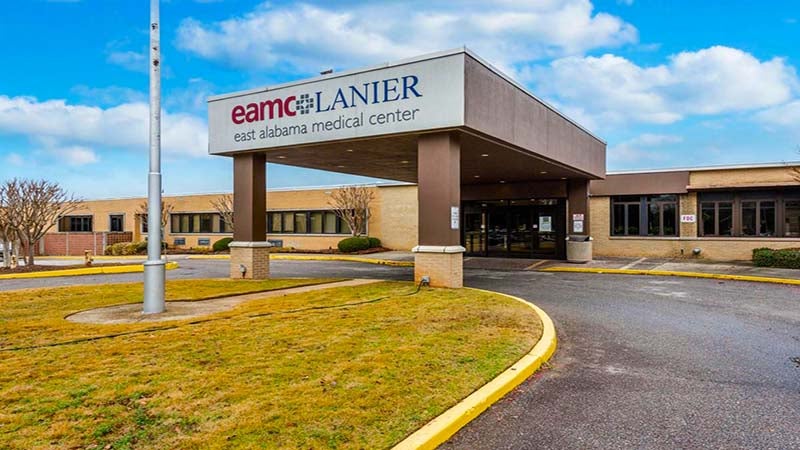4 mill hospital tax to be placed on the Nov. 8 ballot
Published 6:47 am Saturday, July 16, 2022
|
Getting your Trinity Audio player ready...
|
During the Monday meeting of the Chambers County Commission, attorney Skip McCoy introduced a resolution on behalf of the Chattahoochee Valley Hospital Society that would place a referendum on the Nov. 8 ballot for the continuation of the four mill hospital tax in Chambers County.
The current measure is set to expire on Sept. 30, 2023, and has been in effect since 2014.
William Scott, who is a member of the East Alabama Health Board of Directors, was present at the meeting to talk about how this tax has helped the growth of EAMC-Lanier since its inception in 2014.
“Ten years ago, the hospital was not in good financial condition,” Scott told the commission.”We asked for a referendum to allow a 4 mill tax and, graciously, the citizens agreed to do that.”
Hospital Administrator Greg Nichols said in an interview with The Valley Times-News that the money generated from this tax is used as capital to purchase new equipment and renovate EAMC-Lanier.
“One hundred percent of it [tax dollars] stays in Chambers County from an investment standpoint,” Nichols said. “All of that money is here. None of that [money] funds any capital down at the main campus and that’s what we use it for. It was set up really to allow the hospital to purchase new equipment to do renovations … Every penny of it is invested into our facilities here.”
Since going into effect in the fiscal year 2014, the 4 mill tax has generated $10,282,782.42.
East Alabama Health has invested over $21.5 million into Lanier since its affiliation in February 2014.
In those eight and a half years, Nichols said there have been some significant projects that have taken place that would not have been possible without this tax. The projects include the overhaul of what Nichols called the central plant infrastructure (air handlers, generators, chillers, etc.) inside the hospital, the purchase of a 3D mammography unit, the opening of the geriatric psychiatric unit, renovations at the nursing home that recently completed phase one of what he expects to be an eight-phase project and the opening of an acute rehab unit.
“We’re making a difference to people’s lives with that offering in our community,” Nichols said.
In his final pitch for support of this tax, Nichols said he is thankful to those who have supported EAMC-Lanier and welcomed anyone to come to see exactly what this money has been used for.
“Thank you for the ones that have supported us for the last 10 years with this tax,” Nichols said. “I have an open book. Anyone can come to my office anytime, and I’m happy to show them where every dime of this money has gone. But we could not be here without the support of our community. We need it going forward. Without the community support, the hospital is, you know, it’s hard to survive.”
The first vote for this tax took place on May 7, 2013, and was put into effect on Oct. 1, 2013.
Shortly after, East Alabama merged with George H. Lanier Memorial Hospital to become what is now known as EAMC-Lanier in Valley. Many throughout the county have expressed concerns that the tax was implemented to entice another hospital group to takeover Lanier. Nichols said that as he understood, the tax was placed on the ballot because at the time it was thought that George H. Lanier could survive with this tax. He did say having the tax was favorable to East Alabama.
“My understanding and I believe this to be correct, is that the board of [George H.] Lanier at that time implemented that tax and saw that if this passed that would enable them hopefully to stay open.”
He said once the tax went into effect, the board at Lanier started looking at the amount of revenue generated each year versus what the needs were, and the losses made it impossible to remain open. As an obligation to the community that voted for the tax, the board did whatever it deemed necessary to keep the hospital open.
Commissioner James Williams told the commission and Scott that he was for placing the referendum on the ballot for the people to decide but had some concerns about the services the facility provides.
“As a citizen that lives out in the county, I do not live in Valley, I’ve used the hospital,” Williams said. “ I remember when it was a hospital. It’s not a hospital now. In my opinion, it’s a first aid station. Because I have a lot of dealings with emergency services and [if] you talk to any ambulance around here, they ain’t hauling to George H. Lanier, they’re going to East Alabama … That’s my biggest concern.”
Nichols said having a community hospital that provides a fully staffed emergency department 24/7 with a strong relationship with the main hospital in Opelika is essential. This allows people that need more care to be transferred easily, and with the electronic medical records system that cost $7.29 million, doctors in Opelika can see everything that has happened with each patient.
At the commission meeting, Williams also spoke about a rumor he’d heard regarding UAB looking to takeover East Alabama Medical Center. Nichols told the VTN that from EAH’s standpoint, that was not the case.
“I can’t answer for UAB,” Nichols told VTN. “If UAB had [an] interest in this area, I don’t know … I can tell you unequivocally that East Alabama Health has no interest in affiliating with UAB.”




